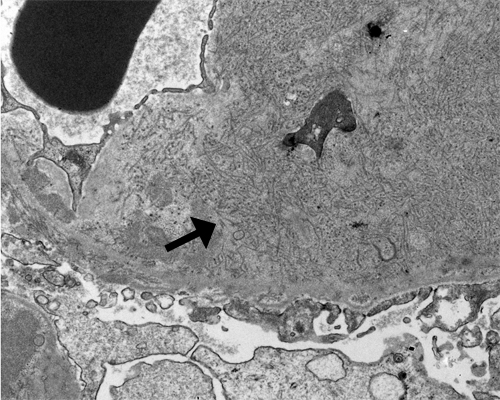Fibrillary Glomerulonephritis (GN)
Contents
What is Fibrillary GN?
Fibrillary GN is a disease which affects the millions of filtering units that make up the kidney. These filtering units are called glomeruli. Each individual glomerulus is composed of multiple layers of straining material.
In this condition, the body produces a large volume of unusual proteins. These proteins enter the filters. The proteins become trapped in the straining layers, disrupting filtration. In some instances these proteins activate the immune system. This causes swelling in these delicate structures.
Over time the swelling can damage the layers of the filters. The damage allows large amounts of proteins to spill into the urine. As the swelling progresses filtering units are damaged beyond repair. They are replaced by scar tissue.
With the loss of enough filters, the kidneys lose the ability to filter and clean the blood. This condition is known as end-stage kidney disease.
Who gets Fibrillary GN?
This disease has been found in patients age 10 to 89. It appears to affect Caucasians at a slightly higher rate. We cannot predict who will develop it. It appears there may be an association of this disease with conditions of immune system dysfunction, such as lupus. This disease can also be found in association with diseases causing chronic immune system activation, such as Hepatitis C.
What are the symptoms?
This disease first affects the individual filtering units of the kidney. The symptoms that develop are linked to this first site of damage. The blood elements then pass into the urine. People often have swelling in their legs or feet. They also have foamy urine, due to a significant loss of protein in the urine. However, patients often develop protein in the urine without swelling. They first become aware of their condition with the detection of protein in the urine on routine urinalysis performed by their primary care doctor.
Red blood cells may pass through the filters into the urine as well. They are usually too few in number to be seen by the naked eye. Blood identified by urinalysis should be confirmed by microscopic evaluation of the urine by a doctor.
As damage to the kidney progresses, individual filtering units are lost. Many patients develop high blood pressure, commonly requiring multiple medications for control. Patients may have difficulty managing their phosphorus balance. They often suffer from anemia. This occurs because the kidney can no longer secrete a substance called erythropoietin. This is a hormone responsible for stimulating bone marrow production of red blood cells.
This disease tends to be a progressive disease. It ultimately leads to loss of kidney function and the need for dialysis or kidney transplant. Symptoms of advanced kidney failure include nausea, fatigue, confusion, loss of appetite, funny taste in the mouth, itching, shortness of breath, or heart palpitations.
What types of tests detect Fibrillary GN?
 Early evidence of kidney damage may be detected on routine lab tests. For example, urinalysis may identify protein or blood loss in the urine. Microscopic exam of the urine can identify other evidence of kidney involvement. Later in the course of the disease, a marker of kidney function can increase, indicating loss of functioning filters. However, as there are many conditions that can damage the filters, the above findings do not always identify this disease.
Early evidence of kidney damage may be detected on routine lab tests. For example, urinalysis may identify protein or blood loss in the urine. Microscopic exam of the urine can identify other evidence of kidney involvement. Later in the course of the disease, a marker of kidney function can increase, indicating loss of functioning filters. However, as there are many conditions that can damage the filters, the above findings do not always identify this disease.
A diagnosis of Fibrillary GN must be made by microscopic examination of kidney tissue. Examination of the tissue may show evidence of protein build up in the filters. Electron-microscopy is ultimately needed to determine the kind of proteins that are present. As part of the evaluation a number of blood tests are often done to evaluate for other renal diseases (ex. HIV or Multiple Myeloma) or conditions associated with this disease.
What are the treatment options?
There is no proven effective therapy for this disease at present. Many therapies have been tried with limited success. Treatments used in the past have included immune changing agents. These agents include steroids, cyclophosphamide, and cyclosporine. In very specific cases, physicians have also tried Plasmapheresis. This is a procedure in which the blood is filtered outside the body in an attempt to remove proteins. The treatment must be determined after testing for associated conditions, such as Lupus or Hepatitis. Evaluation of kidney function, and a detailed review of the kidney sample must be made. Use of suppressing agents must be used realizing the risks of their effects on the immune system.
Clinical Trials
Clinicaltrials.gov provides regularly updated information about federally and privately supported clinical research. It includes information about a trial’s purpose, who may participate, locations, and phone numbers for more details.
Fibrillary GN Podcast
In this UNC Kidney Center podcast, Dr. Ron Falk discusses Fibrillary GN and answers questions from a patient which include:
|
|